|
|
|
Sort Order |
|
|
|
Items / Page
|
|
|
|
|
|
|
| Srl | Item |
| 1 |
ID:
174380
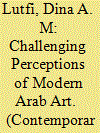

|
|
|
|
|
| Summary/Abstract |
The understanding of modern Arab art is, more often than not, based on individual and collective perceptions that relate to beliefs, culture, and social constructs. Defining qualities or characteristics that make a work of art “Arab” is not a clear-cut endeavor. Many Arab artists appropriated Western techniques, while they strived to combine their newly acquired artistic processes with content inherent in their respective cultures. Some audiences appreciated the new direction the Arab art was taking; however, many artists were harshly criticized of advocating cultural colonialism. A struggle in the field of art, and in other aspects of life took place, due to the increasing fear of losing one’s own tradition and Arab identity in the face of Western culture. This article explores the nature of modern Arab art and Arab identity, its place within a global modernism, and the ways in which Western influences have shaped its development, in addition to understanding the different particularities that have shaped Arab modernism in art specifically.
|
|
|
|
|
|
|
|
|
|
|
|
|
|
|
|
| 2 |
ID:
174377


|
|
|
|
|
| Summary/Abstract |
No keen observer would ignore a clumsily phrased sentence like in the joint statement issued during the October 2019 visit of Prime Minister Narendra Modi to the Kingdom of Saudi Arabia to deliver a keynote speech in the Future Investment Initiative of Saudi Crown Prince Mohammed bin Salman. It said:
|
|
|
|
|
|
|
|
|
|
|
|
|
|
|
|
| 3 |
ID:
174379
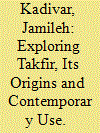

|
|
|
|
|
| Summary/Abstract |
Muslims have been the primary targets of Daesh’s attacks since 2014 in different countries such as Afghanistan, Iraq, and Syria. These attacks were based on its takfiri ideology. As Daesh official media and documents indicate, kufr (unbelief, infidelity) in Daesh’s approach is not limited to non-Muslims (original disbelievers), but Muslims are the most significant parts of kuffar (unbelievers) in its view and defined as incidental disbelievers. Through studying Daesh’s official documents and various Arabic, English, and Persian media productions, in an explanatory research, this article attempts to display Daesh’s takfiri approach toward Muslims and explains its historical and ideological roots, difference with Al-Qaeda’s takfiri approach, different approaches to takfir inside Daesh, main targets of Daesh’s takfir, and the reasons behinds its takfiri view. This article displays that for Daesh, the Muslims are limited only to Sunni Muslims who are accepting and following its approach. Other Sunni and non-Sunni Muslims are thus kuffar. This study also shows that the assertion of takfir has become a method for Daesh to discredit its opponents, such as Shi’a Muslims and other Muslim groups.
|
|
|
|
|
|
|
|
|
|
|
|
|
|
|
|
| 4 |
ID:
174381
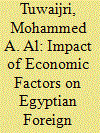

|
|
|
|
|
| Summary/Abstract |
This article attempts to further theoretical and empirical understanding of the extent to which the economic factor had been critical in determining the Egyptian foreign policy between 1978 and 2010. While the following 32 years recorded major shifts in Egypt’s domestic, regional and international affairs, the larger parameters of its foreign policy were forged in the 1970s when specific economic pressures largely determined in which direction Cairo would move. Thus, this analysis seeks to substantiate the argument that the primacy of the domestic sphere has remained recurrent. It also is contended that while economy may have been the catalyst of major foreign policy shifts in Egypt, it was indeed regime security that was—and remains—the primary determinant of the Egyptian foreign policy. The article, hence, concludes that Egypt’s foreign policy was thus determined by economic factors only to the extent that it did not endanger the security of the regime.
|
|
|
|
|
|
|
|
|
|
|
|
|
|
|
|
| 5 |
ID:
174384
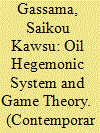

|
|
|
|
|
| Summary/Abstract |
Despite having the largest reserves and forecasts for undiscovered hydrocarbon energy resources in the world, which highlights global energy dependence on the Middle East, a distinct lack of cooperation between regional governments is accompanied by incoherent energy policies and governmental processes that enable trans-regional powers (mainly, Western powers) to dominate resource exploitation and “win the game.” A lack of cooperation between Middle Eastern oil producing countries as well as attendant competition and rivalry allows significant leverage for Western powers to pit one Middle Eastern country against another; thus, permitting Western energy hegemony in the region. Using game theory and a qualitative analytical approach, the authors posit that trans-regional powers, to their advantage, have hegemonic control over regional Middle Eastern powers that maintain the pace of energy production to supply growing demands for predominantly western consumption. The Middle East countries will continue to lose the “game,” especially Iran and Saudi Arabia, if they do not reconcile differences and exploit options for regional cooperation. Such a modification in relations would allow coherent policies and governmental structures to institutionalize and reverse the current trend for extrinsic hegemony.
|
|
|
|
|
|
|
|
|
|
|
|
|
|
|
|
| 6 |
ID:
174383
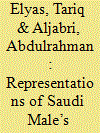

|
|
|
|
|
| Summary/Abstract |
There has been a tremendous interest in the Western media concerning the status of women in Saudi Arabia. The recent reform in women’s rights and guardianship system has Western media gone into motion frenzy. A few research has been done on the representation of Saudi women in Arabic newspapers, but there is a scarce of research in Western English newspapers to date. This article exercises a critical discourse analysis approach to investigate the language used in three famous Western newspapers to uncover the hidden ideologies behind the representation of Saudi women’s guardianship system. To this end, van Dijk’s (2004) analytical framework was employed to reveal the underlying ideologies of six reports by The Washington Post, The Guardian, and Toronto Star. The findings show that the three newspapers have expressed the notion of “otherness” in their descriptions of Saudi Arabia and Saudi women. Furthermore, the newspapers have shared the employment of consensus and negative other-presentation to portray Saudi women as being oppressed and subordinate.
|
|
|
|
|
|
|
|
|
|
|
|
|
|
|
|
| 7 |
ID:
174382


|
|
|
|
|
| Summary/Abstract |
Maintaining global peace and security remains an essential concern for many actors in the international system. To achieve this goal, both states and international organizations commend that action needs to be taken against perceived threats to national and international security. However, how to respond to these threats continues to divide the world. The declining role of the UN in peace enforcement, emergence of non-state actors, new forms of threats, and increasing unilateral actions by states have raised questions over the legitimacy of who, when, and how these actions can be taken. This article seeks to examine how international actors respond to transnational counterterrorism events. It adopts a comparative case study to discuss how regional and international actors reacted to Saudi Arabia’s Operation Decisive Storm in Yemen (2015) and Turkey’s Operation Peace Spring in Northern Syria (2019). It draws important similarities in the justification of both countries’ actions and the varying responses and attitudes these countries have received for their actions. The study identifies the lack of international consensus on transnational counterterrorism as a catalyst in the crisis being witnessed in crisis resolution. Factors such as timing, universality of the threat, prevailing circumstances, actors involved, and mode of operation shape international response on transnational actions.
|
|
|
|
|
|
|
|
|
|
|
|
|
|
|
|
| 8 |
ID:
174378


|
|
|
|
|
| Summary/Abstract |
This is an examination of political, military, economic and cultural relations between Turkey and Afghanistan since 1919. While cultural connections, Turkish security and technical assistance, and bilateral trade have been emphasized throughout this relationship, the closest ties were during the leadership of Turkey’s Kemal Atatürk and the reign of Afghanistan’s King Amanullah when modernization reforms were in vogue in both countries, and more recently since 2002 during the rule of Turkey’s Islam-oriented Justice and Development (AK) Party, which developed an affinity with the leaders of Afghanistan’s Islamic Republic, but kept open connections with the rival Taliban. Both countries included neighboring Iran in their plans for counteracting aggressive moves by the European powers involved in the Middle East, central and south Asia. Since the Second World War, Turkey has been a member of North Atlantic Treaty Organization (NATO), while except for the Marxist period (1978–1992), Afghanistan has preferred nonalignment. However, it has been Turkey’s connection with NATO that has facilitated close ties with Afghanistan.
|
|
|
|
|
|
|
|
|
|
|
|
|
|
|
|
|
|
|
|
|